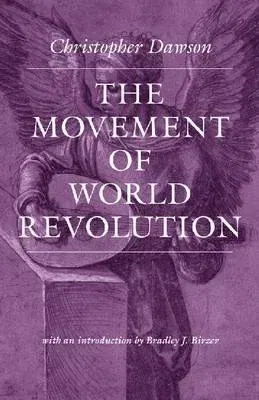Christopher Dawson was one of the most profound historians of his day,
with an acute understanding of the ideas and culture movements behind
the making of Western society. The Movement of World Revolution,
originally published in 1959, explores many of the themes Dawson
considered most important in his lifetime: the religious foundation of
human culture, the central importance of education for the recovery of
Christian humanism, the myth of progress, and the dangers of nationalism
and secular ideologies. Dawson's concern was not so much a solution to
the political, social, or economic problems of his day, but rather an
understanding of the present as it had evolved from the past as well as
the charting of a path into the future.
In this work, Dawson argued that the modern period was "not a
metaphysical age, and in the East no less than in the West men are more
interested in subsistence and coexistence than in essence and
existence." Dawson believed a reduction of culture to material and
technological preoccupations would ultimately end in an impoverishment
of life. His solution was a return to a renewed Christendom, one not
marked by an alliance with secular powers but rather arising out of an
organic, spiritual foundation. The Movement of World Revolution is
remarkably prophetic in anticipating many of the contemporary struggles
about the role of religion in the modern state.
ABOUT THE AUTHOR:
Christopher Dawson (1889-1970) is recognized as one of the most
important Catholic historians of the twentieth century, authoring
numerous books, articles, and scholarly monographs. Dawson was lecturer
in the History of Culture, University College, Exeter; Gifford lecturer;
and Charles Chauncey Stillman Chair of Roman Catholic Studies at Harvard
University from 1958 to 1962.
PRAISE FOR THE BOOK:
"With a vision and flexibility not always apparent in cultural
historians, Dawson dedicates the same ample scholarship and perceptive
intelligence to the West's relations with non-Western peoples in a
period of violent world-wide revolution. By doing so he deepens our
understanding of the changes shaking the world and widens our vision of
the tasks before us. . . . This study of the movement of ideas that made
Europe enables Dawson to give a far deeper and more satisfying account
of the West's impact on the outside world than is possible in the usual
brisk history of Western colonialism and Eastern change."--New York
Times Book Review

